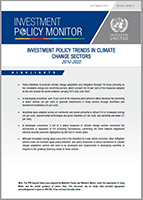
Targeted policies for attracting FDI in climate change mitigation and adaptation sectors matter, 1 probably even more so than in other sectors. In the renewable energy sector, for example, literature shows the critical importance of renewable energy policies to attract FDI in developing countries.
While FDI attraction in the sector also depends on other generally accepted determinants of investment such as institutional and macroeconomic conditions, the single most important determinant to attract FDI in the sector is the existence of renewable energy policies, including risk mitigation mechanisms and tariff regulation (e.g. feed-in tariffs) or regulatory aspects such as access to the grid.
Other important determinants include the provision of international public finance, the existence and quality of PPP mechanisms, and policy stability and longer-term perspective of public policies.
Studies also show that policies play a key role in mitigating the possible environmental harm of FDI in the host country and tapping into the positive environmental externalities, e.g. the transfer of technology and the diffusion of management practices to lower carbon emissions.
Highlights:
- Policy initiatives to promote climate change adaptation and mitigation through FDI focus primarily on the renewable energy and electricity sectors, which account for 60 per cent of the measures adopted to this aim around the world between January 2010 and June 2022.
- In developing economies, over 70 per cent of the measures were aimed to either liberalize the electricity or water sectors (30 per cent) or promote investments in those sectors through incentives and investment facilitation (43 per cent).
- Incentives were adopted across all continents and aimed primarily to attract FDI in renewable energy (42 per cent), environmental technologies and green industries (37 per cent), and electricity and water (21 per cent).
- In developed economies, 3 out of 4 policy measures in climate change sectors concerned the introduction or expansion of FDI screening mechanisms, confirming the trend towards heightened national security concerns highlighted by UNCTAD in recent years.
- Although renewable energy plays a key role in the transition to a low-carbon economy, other mitigation policies have not received equal policy attention, and policy measures to attract investment in climate change adaptation sectors still need to be developed and implemented in developing countries to respond to the growing financing needs in those sectors.




